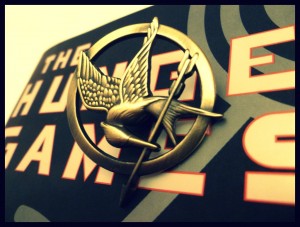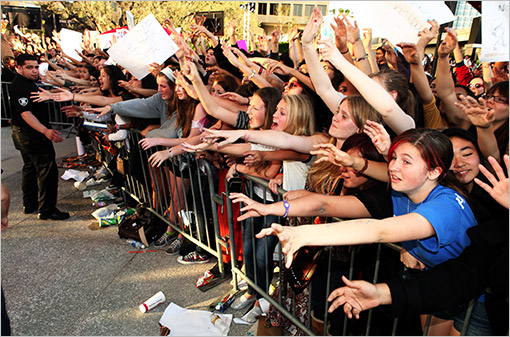‘The Hunger Games’ phenomena: which side are you on?
This review reveals important plot details of “The Hunger Games.”
“I got you this mockingjay pin,” Katniss says in the new “Hunger Games” film. No, you didn’t. Madge did.
Now, if you love “The Hunger Games” but you don’t know who Madge is, you are probably apart from the phenomenon that this franchise has become.
Contrary to popular belief, “The Hunger Games” novel was not released last month—it was published in September of 2008. The final book of the series, “Mockingjay,” was released in 2010.
So why in the last month has everyone’s new obsession become “The Hunger Games”?
The novel by Suzanne Collins depicts a post-apocalyptic world in which teenagers are chosen at random to fight to the death. The governmental figure in the books creates the concept of these “Hunger Games” to teach a lesson to the 12 surrounding districts, which had previously rebelled, in the early years after the apocalypse.
“You become a huge fan of the books, not only because you see an awe-inspiring revolution occurring page after page, but because you can relate to any of the characters in some ways,” said Mallory Kirkland, a sophomore biology major. “Qualities of the characters are qualities of ourselves. And it makes you think, ‘Could you survive on your own, in the wild, with everyone fighting against you?’”
Mix the gladiators of early Rome and “America’s Next Top Model,” and there you have it:“The Hunger Games.”
“I think ‘The Hunger Games’ is a radical idea that many books never even begin to address,” said Michelle Foulke, a sophomore and business major.
Associate professor of English Lynn Coning will be adding the novel to her children’s literature class in the fall.
“This book gives us a lot to talk about,” Coning said. “What in our culture does this story invite us to step back and look at?
“I’m adding it to the class because it is a good read, as well as a great example of modern fantasy and dystopian fiction,” Coning explained.
The book will be replacing another dystopian novel, “The Giver,” by Lois Lowry.
The film adaption of the novel was released on March 23 with the slogan, “The World Will Be Watching.”
Did they nail that one on the head or what?
Within the last month, “The Hunger Games” has become a national phenomenon. Fox News has even aired coverage of the fandom, broadcasting a concern for the intensity of a book’s subject, which involves a game in which children fight to the death.
“It upsets me that people don’t seem to understand that this could happen, and that it does happen in other countries—people literally have to fight to survive,” said Mary Moates, a sophomore writing/communications and theatre major.
The public, though,, now that “Harry Potter” is over and “Twilight” fans are slowly awaiting the arrival of the final movie, faces the growing question, “Is ‘The Hunger Games’ just the flavor of the week?”
If it is, it must be the best flavor ever.
It shattered box office records and became the fastest-selling film ever which is not a sequel. It had the third-highest opening weekend in the United States, falling only behind “Harry Potter and the Deathly Hallows: Part 2” and “The Dark Knight.”
Worldwide the film earned a total of $214.3 million.

With t-shirts, soundtracks and even Facebook and iPhone games, “The Hunger Games” has stuck its nose in almost every aspect of our lives. There’s even a cook book.
All of these items were made available before the actual movie premiered, for the sake of dressing up with your favorite “Team Peeta” shirt for the midnight showing.
But was the movie worth all this trouble?
Now, if you have not read the books but have taken part in the phenomenon, you may think to yourself, “Yes, the movie may have been the most amazing moment of my life.”
With a cast headlined by Jennifer Lawrence, from “X-Men: First Class,” as Katniss Everdeen, Liam Hemsworth as Gale Hawthorn, and Josh Hutcherson playing Peeta Mellark, the film is sure to please everyone at least from a performance standpoint, right?
“Katniss is like a post-apocalyptic Joan of Arc, which is both inspiring and empowering,” Mallory said. “Jennifer Lawrence did a great job. She showed her harshness, bitterness and rebelliousness towards the Capitol, to her mother and to President Snow. She showed her loyalty and love to Prim, Peeta and Gale.”
“I would have to say my fave character would be Katniss,” said Ryan Vaughan, a sophomore and childhood development with teaching licensure major. “She really embodied her character.”
The film to me, though, is only okay.
I feel that Jennifer Lawrence had her moments as Katniss, but at other times she had about as much expression as does Kristen Stewart in “Twilight.” Her best moment had to be her moment after the death of Rue. It was the first time at which I felt she portrayed the determined Katniss I knew from the novel.
But Liam Hemsworth is just bad.
He has no good moments. He is not the strong, supportive figure Gale represents in the book. As far as I’m concerned, he can go back to Australia, and he can take his Hannah Montana with him.
Since that won’t likely happen, we should all hope he gets acting lessons between now and the sequels, because Gale becomes way more than a love interest in these stories.
Josh Hutcherson, though, is amazing. I have no complaints at all about his performance. He portrayed the Peeta from the novel almost perfectly. In a movie in which he had little character development, he definitely stole the show and out-acted everyone else.
“I view Peeta as the not-so-average average guy, and I respect his refusal to be changed by the Capitol,” said Justin Spigelmoyer, a freshman psychology and philosophy major.
Elizabeth Banks and Woody Harrelson both did good jobs portraying Effie Trinket and Haymitch Abernathy, respectively, and Donald Sutherland did a great job as the sinister President Snow.
The supporting cast also did very well, although they were given little screen time.
“I think you have to note Sutherland as President Snow,” Vaughan said. “In the scene of the entry of the tributes, though he is putting on a façade of really being excited and caring, you can tell by his good acting that President Snow even in that moment is extremely cynical,” said Vaughan.
Among critics, the movie had similarly mixed reviews.
“Can ‘The Hunger Games,’ in the movie version directed by Gary Ross, successfully navigate the crossing from page to screen? Our answer: Eh,” said Richard Corliss from TIME Magazine.
Scott Bowles of USA Today said, “Like the select participants of its savage sport, ‘The Hunger Games’ stands triumphant, if scarred and a bit wobbly from the contest.”
“The movie, in my opinion, was really good,” Mallory said. “Yes, there was some stuff left out. Yes, there was some stuff added. But the movie cannot be a perfect adaptation of the book. They are going to have to elaborate to those people Katniss’s insight that she gives in the book; otherwise, it would be like “Twilight,” with Bella and Edward constantly staring at each other in silence the whole movie.”
“I really enjoyed the movie—even apart from knowing the book—because I feel it really knew how to tug at people’s emotions,” Spigelmoyer said. “I was amazed how quickly each scene could build up suspense, relax to a calm, then rush back into suspense.”
“I was disappointed in some of the things missing in the movie,” Foulke said. “Some
parts I found to be critical scenes that without them you miss
character development and lack the full impact of what’s occurring.”
The film was nowhere near what I was hoping for. Character development was non-existent, and some primary characters from the book, such as Cinna (Lenny Kravitz) and Rue (Amandla Steinberg), were given maybe 10 lines each.
I understand that it could only last two hours and 30 minutes, but director Gary Ross sure didn’t mind adding in things that did not even happen in the book.
“You missed big things that aren’t imperative to the movie itself to be complete but imperative for the movie to be complete for a fan of the books,” said Justin Kirkland, a senior English and writing/communications major. “It is realistic; it’s not a vampire or witchcraft or wizardry. This … could be our future. That is what I think draws us in.”
“What annoys me the most is it isn’t a love-triangle story; it’s not ‘Twilight’,” he said with a tone of disgust. “But there are going to be people everywhere that will miss the point.”
Like the fandom of the “Twilight” series, fans of “The Hunger Games” have started to choose “teams.” People with shirts saying “Team Peeta” or “Team Gale” filled the theater which I was in for the midnight premiere.
Is the love-triangle aspect of this story what draws everyone to the fandom?
I think so. Why else would Gary Ross completely cut out the last scene of the book, in which Katniss admits to Peeta that she thinks the romance between them was only a survival tactic of which she thought Peeta was a part.
Instead, we get the dramatic final scene: Peeta grabs Katniss’ hand, Peeta smiles, and Katniss looks up and her eyes meet Gale’s. End of movie.
So, instead of leaving with a curiosity about the uprising we saw in District 11 (which sets up the sequel), we leave with the hope that Katniss will choose our favorite competitor for her heart. No one seems to be lamenting the dead competitors of “The Hunger Games” and the effect it had on their society.
“I think that when society finds entertainment in a movie like this, instead of taking away the true message Collins intended, we should feel disgusted with ourselves,” Moates said.” “It makes us no better than ‘The Capitol’ from the novel.
“It’s sad that people come out of the theater laughing, when they just witnessed 22 deaths, but it doesn’t faze them because they would rather talk about how cute Peeta and Gale were,” Moates continued “I wonder if they know how many children might die like this every day.”
Even without the “team” mentality, “The Hunger Games” and the franchise it will become has its real fans: the ones who care more about the subject matter than who Katniss chooses in the end.
“I like that ‘The Hunger Games’ is directed towards a more mature audience and isn’t quite the same clichéd ‘love story,’” Spigelmoyer said. “It’s new and refreshing. And without sparkly vampires.”
The film adaption of the second book, “Catching Fire,” is set for release in November of next year.
If you have time over the next year, read the books before you stand outside of the Pinnacle for three hours waiting for the midnight premiere.
Appreciate what the books stand for and realize that if you find movies about teenagers fighting to the death entertaining, that makes you no better than the Capitol.
And as for the direction of the next two movies—whether they emphasize the rebellion against the Capitol or over-exaggerate the love triangle among Katniss, Peeta and Gale—well, may the odds be ever in their favor.


